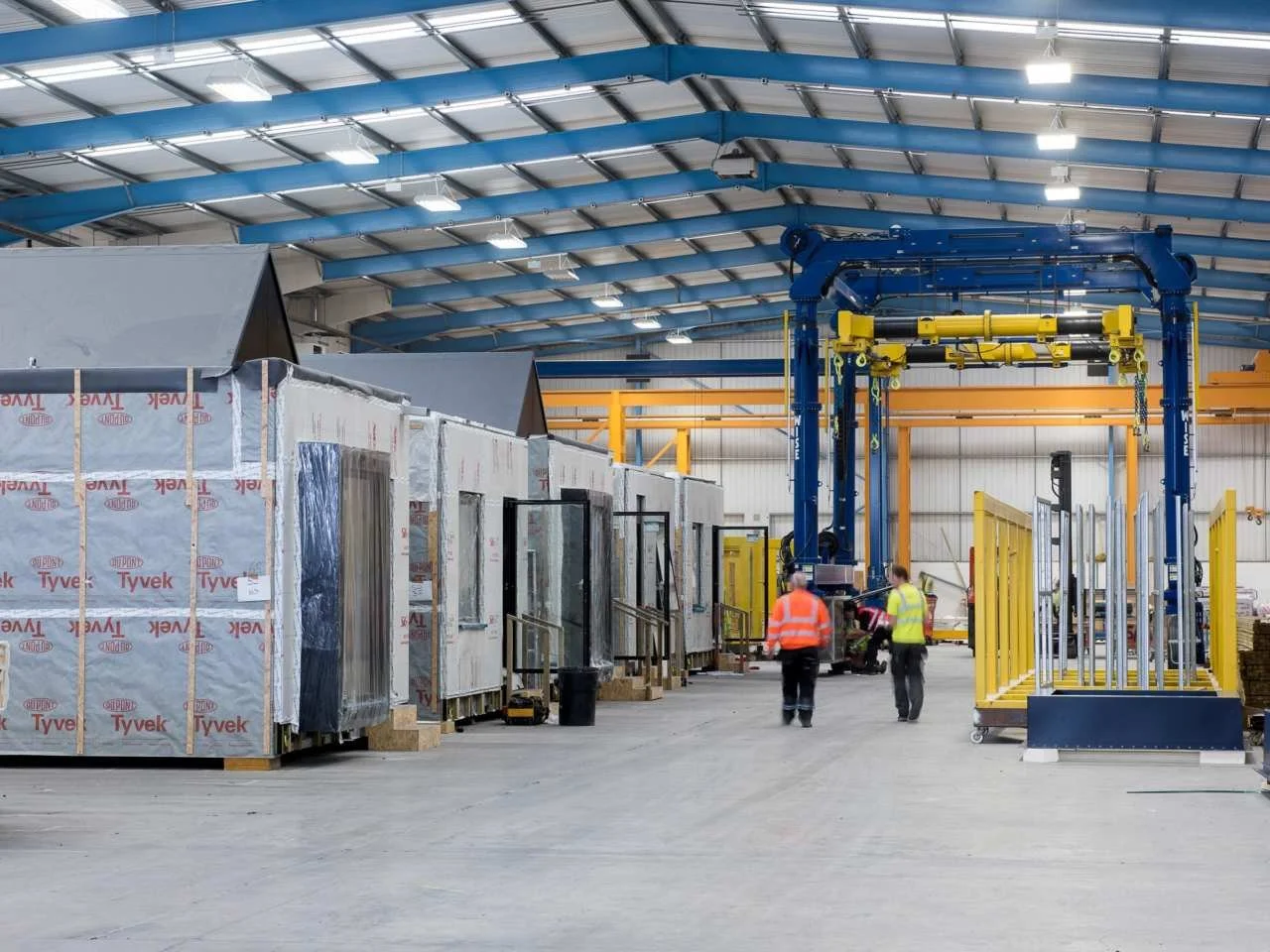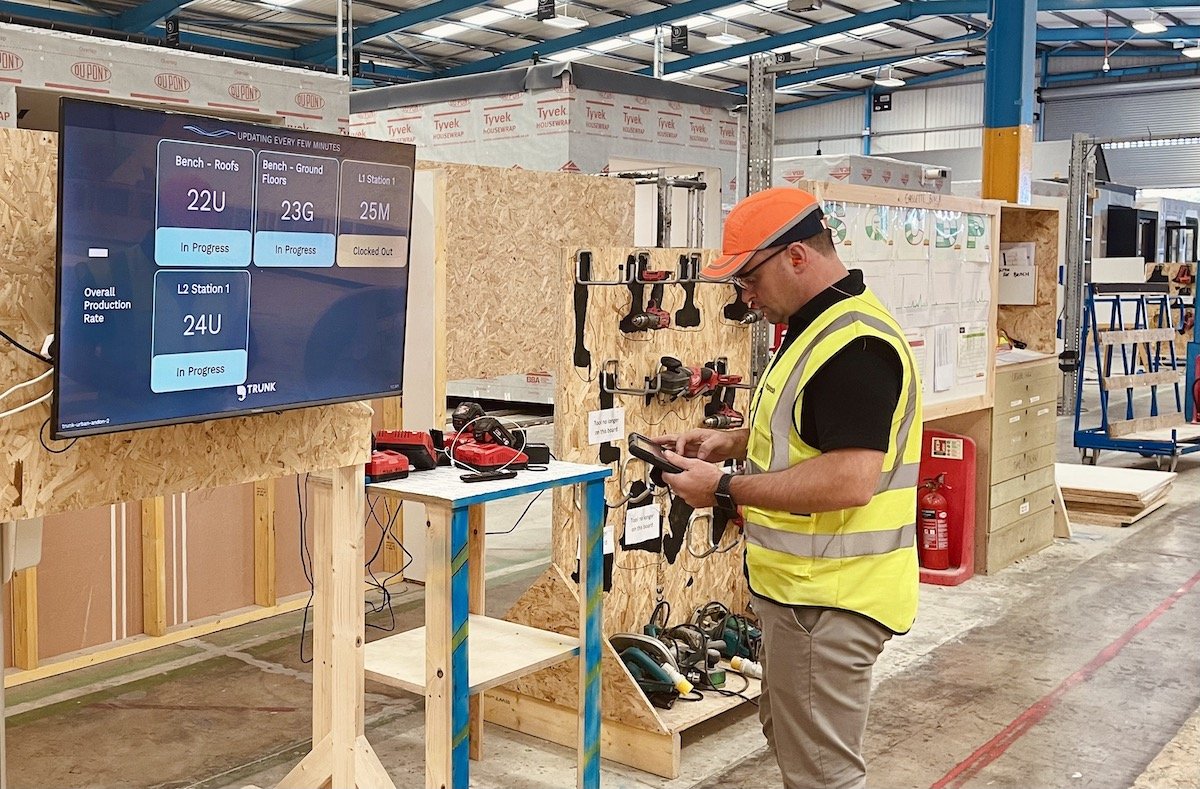Walk the Line: Dan Pollard from Urban Splash
We caught up with Dan Pollard who heads up manufacturing at Urban Splash to gather his opinions on where offsite construction is going, current challenges and the opportunities for using technology.
Dan Pollard
Head of Manufacturing
House by Urban Splash
Listen to the interview here, or read on below….
Dan, could you tell us a little bit about yourself and your role at Urban Splash?
“I’ve been in offsite construction for around 17 years. I started at a steel frame construction company called Elliott's Modular where I began learning as a supervisor.
From Elliott’s I then moved over to a company called Eco Modular Buildings, where we built schools. I worked my way up from Lead Supervisor to Manufacturing Director. During this time, I had learned about the niche in the housing construction market and wanted to get into creating homes inside a factory.
I had been in talks with Urban Splash and later decided to move across to the modular side of their business, House by Urban Splash.
Wirral Waters Development — House by Urban Splash
Urban Splash as a company is relatively new to offsite construction and have only been trading for around 2 years. I joined the company when it was around a year old and have worked on building everything from processes to culture. It is a fast-paced, fluid environment and one that has its foundations in a continuous improvement mindset.
“At Urban Splash we’re building communities for people. It’s not just a house. We are building infrastructure and parks to create an environment that nurtures families. It’s a very exciting time for offsite, and I’m glad to be part of the Urban Splash revolution.”
A lot has happened in the past 12 months, but tell us about some successes?
A real bonus of working for a company like Urban Splash is that we use any challenges to improve, but it’s the achievements we make every day that define us. Our people have pride and passion in what they do, which is hugely important for us as a team and company.
If I had to name my top five, I think the list would look like this:
The quality of the modules has gone through the roof. We started at a rate of 37% right first time and now we're at 99%, which is a huge credit to the team.
The development of our processes.
The apprentice academy we have established.
The reduction in cost to make the company more sustainable.
The business culture we have managed to build.
“For us, the culture is about listening to the experts, and the experts are the ones on the production line who work with the tools and the processes 8 hours a day, 5 days a week.”
The people side of the business is something that really encouraged us to start the MMC Academy which we established with 7 apprentices to give ourselves and them a chance to see how it would work.
In January, we're hoping to bring another 15 in, and then from there have 5 to 10 new apprentices every 6 months. We want to make sure that the apprentices feel valued and a real part of the team – they will eventually become leaders of the company, so we strive to nurture them from the very beginning.
Looking ahead, what's the exciting thing you'll be working on?
For me, the next 12 months need to have a consistent build approach as well as building on the people side of the business.
“A big focus right now is leading the implementation of Trunk to transform the way we deliver our offsite projects at Urban Splash.”
From managing production, dynamic scheduling, dispatching takt times and tracking quality—we’re improving efficiencies right across planning, manufacturing, transportation and on-site assembly.
Later down the line, we’re interested in automation but not before we have a stable product and a stable manufacturing flow.
I think that can be the downfall of most businesses, they think a flashy piece of kit or the next big thing in the factory will ramp up morale, production, run rate and quality.
It's not about that.
It's about the people, it's about the processes and it's about the team facing the same direction.
Some housing developers see offsite construction as risky – why do you think this is?
I think it’s a fear of the unknown. I also think there's a bit of snobbery involved, too. In continental Europe, for instance, people often associate offsite with low quality, uniformed-style housing. Whereas in the UK, offsite invokes memories of cheap prefab bungalows built to solve the post-war housing shortage.
For me, the times are changing. If you went to buy a sports car from McLaren, would you expect it to be built in a cold wet field, or a controlled environment, like a factory?
If people always thought with the mindset of, "this is how we've always done it." We wouldn't be talking now via this video call. We wouldn't be getting on aeroplanes. We wouldn't be driving electric cars.
I do think the more and more projects that are successfully delivered with offsite, the traditionalists will start to waver.
“Now that we’ve switched-up the mindset from a building site with a roof on it—to a controlled manufacturing facility—we’re also trying to change the landscape of the industry with show & tell factory visits and events.”
What do you think is needed for offsite construction to take root and become the main way we build?
Continuing with the car analogy, let's go right back to the 1980s and the Sinclair C5.
A Sinclair C5
When that came out, everyone thought it was crazy. Then Tesla came, and everyone said it would never catch on. But now, we know that by 2030 all new cars that are manufactured need to be electric.
Why wouldn’t you want your home built in a clean environment where you can control quality, safety and cost?
Look at the internet when it first started. It never caught on, did it?
Nobody used it.
And now what do we do without it? I think like electric cars, once the comfort is there across the industry, there'll be something from the government that says, "certain houses have to be built using MMC methodologies."
In terms of the controlled environment, where do you think panelised construction fits into this?
For me, panelised construction isn't offsite construction.
Offsite construction is a completed module leaving the factory to eliminate site times.
But there are benefits to using a panelised system, whether that be transportation or speed.
You'll be faster in the factory when building just a panel, but then you've got to weigh up the site times. You've got the wet trade, the quality issues, and the health and safety issues.
There's enough work for everybody in the UK to go around.
I'm on the bench for offsite construction, and that you do as much as you can in that controlled environment before you send it to the site.
We want the site teams to be in-and-out like an F1 pit crew.
What’s on the horizon for offsite construction and MMC?
There are lots of discussion points regarding MMC and the future, but I honestly believe the best way to predict the future landscape of offsite construction is to invent one. And that is what we're doing every day at Urban Splash. We're inventing new ways of constructing, new ways of liaising and engaging with our people.
So, if the future is not there, let's invent one together.
We need the heads of leading construction companies to come together because we're all doing the same thing in different ways.
“It would be great to bring all the heads of MMC companies to the table, and ask how are you doing this? What works for you? What doesn’t work for you? And have that Mount Rushmore of offsite heads that are feeding into the government and solving this housing crisis.”
And to end, who are you passing the mic to next?
“I’m passing the mic to Ryan Geldard from the brilliant M-AR Offsite.
Over and out!”








